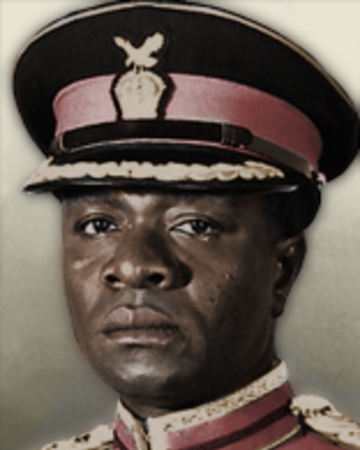The Tragedy of Ignatius Acheampong: Visionary and Kleptocrat (PT.1)
Colonel (later General) Ignatius Kutu Acheampong (1931-1979), Chairman of the National Redemption Council (NRC) from 1972 to 1975 and of the Supreme Military Council (SMC) from 1975 to 1978.
Colonel (later General) Ignatius Kutu Acheampong (1931-1979), Chairman of the National Redemption Council (NRC) from 1972 to 1975 and of the Supreme Military Council (SMC) from 1975 to 1978.
“Beloved Ghana, born with a deep sense of pride, nurtured with unshakeable courage, has said goodbye forever to reaction, to timidity and hypocrisy in Government, and to the suppression of the interests and welfare of the people. Together we shall make Ghana great.
Long live the revolution. Long live Ghana. May God bless us all.”
- Colonel Ignatius Acheampong speaking at a Durbar of Chiefs in August 1972.
Ignatius Acheampong, the one-time military ruler of Ghana occupies an unenviable position in the political history of the first
- Colonel Ignatius Acheampong speaking at a Durbar of Chiefs in August 1972.
Ignatius Acheampong, the one-time military ruler of Ghana occupies an unenviable position in the political history of the first
Black African nation to have been granted independence by a colonial power. Deposed first in a palace coup by his colleagues, who stripped him of his rank and honours, he was later executed by firing squad after a perfunctory trial held by junior members of the
armed forces whose violent uprising was in many ways a reflection of the groundswell of public anger at the parlous state Ghana found itself during the 1970s. It was a state of affairs for which many of his countrymen blamed him. Acheampong was held responsible for the acute
economic problems that beset the nation, including shortages of basic necessities, a debilitating brain drain and endemic corruption. It was a far cry from the heady days at the beginning of his leadership when he projected a spirit of optimism and a sense of purpose grounded on
firm ideas about how to create the conditions by which Ghana could eventually become economically self-sufficient. It is this neglected aspect of Acheampong’s rule that requires recapitulation and reappraisal. For it reveals a man with a clear vision about how a post-colonial
African nation could be transformed, but who was hindered not only by extraneous economic events such as the oil crisis of 1973, but primarily by an inability to properly select and synthesize the appropriate ideas that could have enabled him to achieve this objective.
examining the political career of Acheampong also necessarily reveals certain constant features that have continually bedevilled African state and impeded their development: the inter-ethnic rivalries, the ineffectual post-colonial structures of governance, as well as a pervasive
inclination to submit to tyranny. A visionary who succumbed to the temptations inherent to the wielding of untrammelled power; the tragedy of Ignatius Acheampong encapsulates the tragedy of the African continent.
Ignatius Kutu Acheampong was
Ignatius Kutu Acheampong was
born in 1931 in Trabuom, a town in the Ashanti Region of British-ruled Gold Coast which came to be known as the nation of Ghana after it secured its independence in 1957. Raised in the Roman Catholic faith, Acheampong worked, among other things, as a stenographer before
enlisting as a private in the British colonial army in 1951. He received officer-training at Aldershot in England and was commissioned into the Ghana Army as a Second Lieutenant in 1959. He was a member of the contingent of Ghanaian troops who served as part of the United
Nations Peacekeeping Force in the Congo in the early 1960s and later during the period of military rule that followed the overthrow of the government of Dr. Kwame Nkrumah, and as a lieutenant colonel, Acheampong was appointed to serve as the Chairman for the Western
Regional Committee of Administration. He was the Commanding Officer of the First Infantry Brigade at the time of the coup that led to the ousting of Dr. Kofi Busia on January 13th 1972.
Acheampong’s bloodless coup brought about the suspension of
Acheampong’s bloodless coup brought about the suspension of
the 1969 Constitution, the proscribing of political parties and political activity, as well as the detention
of those whom he suspected of threatening his government, a junta which he called the National Redemption Council (NRC).
He consolidated his power and was quick to notify his countrymen and the world that his coming to power was nothing
He consolidated his power and was quick to notify his countrymen and the world that his coming to power was nothing
short of a revolution. Indeed, he would declare that “ours is a Revolution that must achieve the permanent transformation of our nation”. He would from the start reveal a programme of national development which owed more than a passing reference to the ideology and nationalist
sentiment of the Nkrumah era. He spoke of “the dignity of man, equal opportunities for all, (and) the equitable distribution of our resources.”
It is useful however, to explain why a man who was not trained to manage a national economy and who came to power by force
It is useful however, to explain why a man who was not trained to manage a national economy and who came to power by force
should be deserving of a serious examination as a political agent.

 Read on Twitter
Read on Twitter


